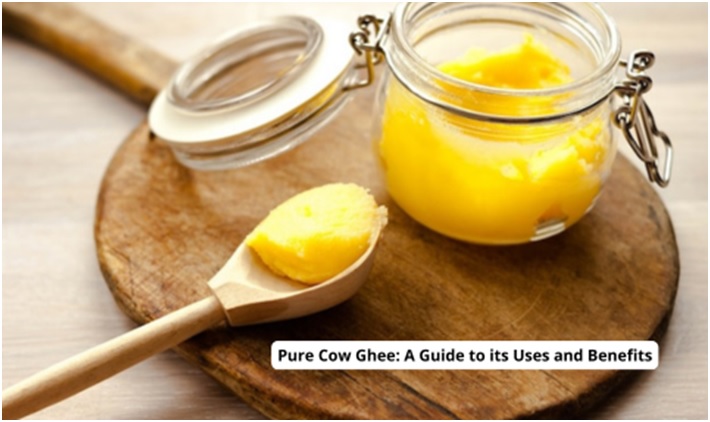People are getting really conscious about the foods they eat and which oil they use in cooking. The more informed people get about their diets, the more controversy over what type of cooking fat is the healthiest. Gir Cow Ghee and oils such as sunflower or vegetable oil are often discussed.
A2 bilona gir cow ghee is prepared from A2 cows, so it is prepared from Gir cows. A2 bilona ghee has all the important vitamins, like vitamins A, D, E, and K, and it contains healthy fats in the form of omega-3s. Therefore, this ghee improves digestion, the health of the heart, and immunizes you. MCTs are also present in Gir Cow Ghee; these increase metabolism and support weight loss.
Conversely, refined oils are found aplenty in kitchens but tend to lose many nutrients during the process of refining. These are replete with omega-6 fatty acids; a sort of poisonous effect has been found if one exceeds the intake levels, as it results in chronic diseases due to inflammation. Though some refined oils are fortified with nutrients, they cannot match the natural richness of Gir Cow Ghee.
The present blog will help in comparing Gir Cow Ghee with refined oils; therefore, all about the nutritional values, the health benefits, and what it might give to the human body by affecting your general health.
What is Gir Cow Ghee?
Gir Cow Ghee is the clarified butter that is made from Boon’s milk of Indian Gir cows which are well known to produce quality milk. To make the Gir Cow Ghee, the first step involves boiling the milk and using or separating the butter part from it. The butter on the other hand is melted until it slightly browns and exudes a rich smell. The Gir Cow Ghee is free from water or milk solid and it is not an emulsification like ordinary butter.
One of the key benefits of Gir Cow Ghee comes from its source: A2 milk. A2 milk is considered healthier compared to A1 milk which is present in most of the dairy forms. A1 milk may lead to some digestion upset or other complications in some individuals, while A2 milk is comparatively easy on the stomach. This makes Gir Cow Ghee a suitable product for those who have a sensitive stomach and cannot tolerate normal dairy products well.
Many nutrients exist in this Ghee but it is easier to digest than the ghee of other cows This is the ghee of Banjara. Among the,m we have FAT soluble vitamins like Vitamin A, D, E and K. The interest included of these vitamins is that they are used in different processes in the body for example the health of your skin, bones, and the immune system. Gir Cow Ghee also contains butyrate which is also a short-chain fatty acid that is beneficial in maintaining gut health and avoiding inflammation. Also, it is a rich source of omega-3 fatty acids that are important in the proper functioning of our brains, protection against heart diseases and the well-being of joints.
The unique qualities of Gir Cow Ghee include vitamins, some fatty acids, and digestion health and thus should be allowed in our diet. They can be employed as a cooking ingredient, or even as a dessert in baking or simply as a seasoning or garnish on various foods. Not only does it provide a richer and tastier flavor, but while the product is brimming with goodness, it far surpasses the health benefits of normal ghee or butter produced from A1 milk.
Finally, Gir Cow Ghee is indeed a natural, healthy, and very healthy product extracted from A2 Milk. The meal’s soft texture, high nutrient value and its health impact make it quite recommendable for anyone seeking better ways to enhance their diets.
What is Refined Oil?
Refined oil can also be described as vegetable or seed oil meaning oil that has been processed very lightly to a completely clear colorless, odorless, and tasteless substance. Using his words, other examples of sources with zero glycemic index include such nuts as sunflower oil, canola oil, soybean oil, and corn oil. To achieve these states, the oil gets bleached, deodorized, and filtered; most of them lose their nutrients and antioxidants in the process.
Refineries make oils that are high in polyunsaturated fats, including the necessary but small amount of omega-6 fatty acids for the body. They also subject these oils to chemical processes, which create unhealthy trans fats and can oxidize, thereby potentially harming the body.
Nutritional Comparison: Gir Cow Ghee vs. Refined Oil
One of the key differences between Gir Cow Ghee and refined oil is the nutritional content. Let’s compare the major components of both:
1. Fats Content:
- Gir Cow Ghee: Possesses good saturated fats that are like MCTs (medium-chain triglycerides), indicating even rapid energy, very helpful in weight reduction, and also helps improve the brain.
- Refined Oil: The purified oils are those heart oils that must be overwhelmed in moderation, as they generally induce inflammation in the body; Omega-6 fatty acids are generally linked to this.
2. Vitamins and Nutrients:
- Gir Cow Ghee: Gir Cow Ghee contains vitamins, particularly the importance of vitamins A, D, E, and K in Gir Cow Ghee for skin, bones, and the immune system.
- Refined Oil: Extract all good nutrients at the time of processing, part of it is returned later.
3. Omega Fatty Acids:
- Gir Cow Ghee: Healthy Omega-3 fatty acids obtained from grass-fed cow products, can prove beneficial for your heart. It also reduces inflammation.
- Refined Oil: It basically consists of Omega-6 fatty acids; taking it in excess can lead to many health-related issues like inflammation.
4. Antioxidants:
- Gir Cow Ghee: Vitamin E and CLA that prevent stress and maintain healthy health.
- Refined Oil: It has few or no antioxidants since it is refined, so it doesn’t help combat free radicals.
Health Benefits: Gir Cow Ghee vs. Refined Oil
1. Digestibility:
- Gir Cow Ghee: This one is full of butyrate, which is good for gut health, will reduce any inflammation, and help with digestion. Also can be used where one has a sensitive stomach or if lactose intolerant.
- Refined Oil: Harder to digest in larger amounts and will increase gut inflammation because of the high omega-6 levels.
2. Weight Management:
- Gir Cow Ghee: There are some saturated fats, but it enhances metabolism increasing fat accumulation.
- Refined Oils: Have calories and comprise a huge concentration of omega-6 fats, which increases weight and causes the metabolism of insulin within your body.
3. Cardiovascular Health
- Gir Cow Ghee: It maintains good heart health by maintaining low bad cholesterol and maintaining enough fats in one’s body.
- Refined oil: Omega-6 fatty acids, which increase inflammation and result in heart disease. In this respect, olive oil is good for health but not the case for other refined oils.
4. Bone Health:
- Gir Cow Ghee: It contains vitamin K2, which helps the body absorb calcium and build strong bones.
- Refined Oil: It lacks the nutrients necessary for healthy bones.
Cooking with Gir Cow Ghee vs. Refined Oil
The type of fat makes a significant difference in the taste, texture, and nutritional value of whatever is being prepared. Following is a comparison of how each of these fats performs in cooking:
1. Flavor:
- Gir Cow Ghee: It brings deep, nutty, and perfumed tastes to every dish. It’s an evergreen favorite in Indian cooking because it enhances the flavor of both savory and sweet dishes.
- Refined Oil: Its flavor is mighty neutral, making it suitable across almost every category of cooking.
2. Healthier Cooking Methods:
- Gir Cow Ghee: Stands best for slow cooking, grilling, and frying due to its stability. This decreases the rate of harmful substances produced when heated.
- Refined Oil: This should be used with low to medium heat cooking as it tends not to form unhealthy compounds, which might include trans fats, at any high heat prolonged cooking.
Environmental Impact: Gir Cow Ghee Vs. Refined Oil
Although we have mainly focused on the health benefits of Gir Cow Ghee and refined oils, the environmental effects of both are also crucial to consider. Each product impacts the environment differently based on the source and production method. Understanding these environmental factors will allow consumers to make more informed choices when selecting cooking fats for both health and sustainability.
1. Impact of Gir Cow Ghee and Dairy Farming
Since it is a product of dairy farming, the A2 bilona gir cow ghee has many direct environmental concerns attributed to the kind of production. In many respects, animal-based farming for its massive scale creates an extensive carbon footprint that can compare unfavorably to that produced through plant-based oils. These have some major issues such as
- Land Use: Cows take a lot of grazing land or feed crops, meaning more land usage compared to plant-based products. This further implies that much water is needed for the cows and the cultivation of their feeds.
- Greenhouse Gas Emissions: Cows produce methane through digestion, a very potent greenhouse gas. It thus adds up to the general greenhouse gas emissions in the dairy industry, a primary contributor to climate change.
- Water Use: Dairy farming is well known to use a lot of water. For example, there is water for the cows themselves and for irrigating crops fed to the cows, depending on the water usage in a region.
However, the Gir Cow Ghee is made using milk from ethical and sustainable farms that will help minimize the negative impacts on the environment. Small-scale, grass-fed dairy farms generally produce fewer emissions and are often more mindful of their land use and water consumption. Sustainable farming practices, like rotational grazing and natural feed methods, can be beneficial for the health of the ecosystem and, therefore, to the overall environmental footprint of A2 ghee.
2. Environmental Impact of Refined Oils
Refined oils, especially those derived from crops such as palm oil, soybean oil, and canola oil, have their own sets of environmental concerns. The production of such crops could have very crucial environmental impacts such as
- Deforestation and Habitat Loss: Palm oil has gained notorious fame for contributing to the massive deforestation process in tropical countries, particularly Southeast Asia. Many rainforests have been cut down to be plantations for palm oil, eliminating habitats of numerous species important for the global ecosystem, including numerous orangutans and tigers. Soybeans also often destroy forests when used to farm a large expanse of land, especially in the Amazon rainforest.
- Biodiversity Loss: Large-scale monoculture farming practices will dominate crops such as soy and canola, which will replace the natural diversity of ecosystems with vast fields. This reduces biodiversity and will disrupt local ecosystems to lessen pollinator species and other vital organisms.
- Soil Degradation: Soil nutrient depletion is the result of monoculture farming. Thereby, soil erosion takes place. Further, reliance on chemical fertilizers and pesticides does not positively affect soil. Soil thus cannot support people in the long term with sustainable agriculture.
Nevertheless, refined oil that is developed from organic or sustainably grown crops comes in as another more environmentally friendly choice. These are soybean and canola oil and are from farms prioritizing biodiversity and good soil condition as well as a reduced number of chemicals on them. Second, there’s also RSPO or Roundtable on Sustainable Palm Oil, striving to minimize environmental degradation due to the production process through responsible planting techniques that not only preserve ecology but also decent working conditions.
Conclusion:
So, which is healthier—Gir Cow Ghee or refined oil? The answer depends on your dietary preferences, health goals, and cooking needs. If you prefer a richer, more traditional choice that really offers many benefits- from improved digestion and heart function to weight management- A2 ghee would be a good candidate. It also offers essential vitamins, healthy fats, and antioxidants, along with improved stability for high-temperature cooking.
Refinement of oils doesn’t mean it does not belong to a healthy diet. Certain types of refining oils will suit certain kinds of cooking methods and are much lower in saturated fat. Oils should be sufficiently refined and processed while retaining excellent amounts of omega-3 fatty acids.
In the end, every healthy food should be consumed only in moderation and within a well-balanced, entire food diet. A healthy lifestyle can embody solutions that have benefited Gir Cow Ghee and refined oils at diverse times, combining well when combined.




